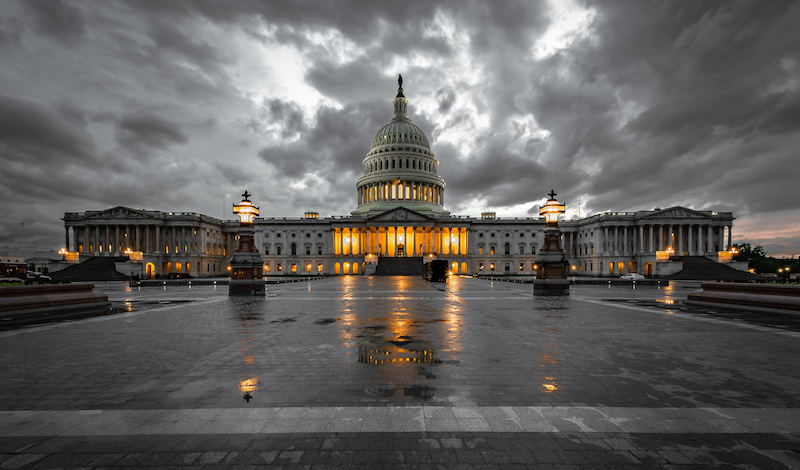
The legislature should use its constitutional authority under the Disqualification Clause to uphold democracy.
At least two newly elected representatives to the United States Congress have been credibly accused of actively participating in the violent insurrection at the U.S. Capitol on January 6, 2021. These accusations should be investigated and, if found to have substance, should serve as sufficient constitutional grounds for exclusion from membership in the new Congress.
Max Miller, a White House aide to former President Donald Trump, allegedly played a direct role in rallying the mob on January 6, including a key organizational role. Miller was elected to represent the Seventh District of Ohio in the U.S. House of Representatives.
Miller has previously been subpoenaed to testify and produce documents to the January 6th Committee investigating the attack on the Capitol. The Committee’s chair, Representative Bennie Thompson (D-Mississippi), states that “credible evidence” ties Miller to an organizing meeting to plan the insurrection with Trump and other operatives at the White House on January 4, 2021.
Derrick Van Orden, a former Navy SEAL officer, also reportedly participated in the mob that attacked the Capitol on January 6. He won election to the House to represent Wisconsin’s Third District.
Social media posts place Van Orden at the scene on January 6 posing with other insurrectionists on restricted Capitol grounds. Van Orden allegedly used campaign finance funds to make the trip to Washington for the purpose of supporting the insurrection.
If these allegations are true, Congress should exclude Miller, Van Orden, and any other elected official who are proven to have participated in or helped to plan the insurrection at the Capitol. Van Orden, despite social media evidence to the contrary, denies that he trespassed on Capitol grounds or joined in any violence. George Santos, a newly elected representative to the House from New York, attended the Trump rally on January 6, but does not appear to have joined the march or assault on the Capitol.
The House acting as a whole has the authority to exclude. The U.S. Constitution recognizes that violent insurrection is incompatible with the democratic processes of representative government. The Disqualification Clause of the Fourteenth Amendment gives Congress, specifically the House and the Senate, respectively and separately, the power to exclude or expel anyone who, having previously sworn an oath to defend the Constitution as a government official or military officer, has “engaged in insurrection or rebellion.”
The House and the Senate each have the power to exclude a member by a majority vote—or to expel a member by a two-thirds vote. The best argument is that this power is self-executing and does not require specific legislation, though the Supreme Court has left this question open in a previous membership exclusion case decided in a different context and on different grounds.
The constitutional power of exclusion for insurrection has largely lain dormant since the Civil War, with the exception of a case of alleged treason during World War I. In the Civil War era, Congress excluded or expelled a number of former Confederate politicians and military officers until an Amnesty Act was passed in 1872, though former military officers were still then banned.
Fast forwarding to today, it is time to dust off the Disqualification Clause and apply it again fairly and vigorously.
In the relevant part, the constitutional text provides: “No person shall be a Senator or Representative in Congress…who, having previously taken an oath, as a member of Congress, or as an officer of the United States…to support the Constitution of the United States, shall have engaged in insurrection or rebellion against the same, or given aid or comfort to the enemies thereof.”
Both Miller and Van Orden have previously sworn an oath to defend the Constitution as military officers: Miller as a former U.S. Marine corporal and Van Orden as a former Navy SEAL. Therefore, they each meet the legal requirement of having sworn an oath of allegiance to the Constitution.
At a minimum, the January 6th Committee should hold hearings to determine further facts about whether Miller and Van Orden supported or, in the language of the constitutional text, “engaged in” or gave “aid or comfort” to those who perpetrated the violent insurrection at the Capitol. If they did, then the Committee should recommend that the full House should vote to exclude them from membership. In the alternative, if the evidence is ambiguous, the House acting as a whole could at least vote to censure Miller, Van Orden, or any other elected official implicated in the insurrection.
No evidence currently exists that any elected U.S. senator supported the insurrection with the requisite intent—although some who voted against the certification of the election may have come close. Senator Josh Hawley (R-Missouri), for example, pumped his fist in support of the insurrectionist mob, though he was then later seen running for his life out of the Capitol. If evidence emerges that any other elected U.S. representative or senator actively supported the insurrection, then they should be excluded or expelled from membership as well – or, again in the alternative, at least censured.
It is one thing for Trump-influenced Republicans to accept and repeat the travesty of election denial, claiming without any factual support whatsoever that the election of Joseph R. Biden as President in 2020 was somehow “stolen.” This sort of big lie currently falls into the category of political speech protected by the First Amendment.
It is quite another thing, though, to engage in and directly support by concrete action a violent insurrection against Congress and the Capitol in order to prevent the peaceful transfer of power to a duly elected and legitimately certified new President. Planning or otherwise participating in this kind of violence is plainly inconsistent with any federal oath of office to “support and defend the Constitution of the United States against all enemies, foreign and domestic.”
Excluding Miller and Van Orden would not likely significantly change the political balance of power in the House. This proposal is therefore not politically motivated, except in the sense that enforcing a basic respect for dealing with disagreements through peaceful elections rather than violence is a necessary foundational principle for any democratic republic to continue to exist.
It is also an insufficient answer to say that the people in Miller and Van Orden’s districts in Ohio and Wisconsin, respectively, have ratified their behavior by voting for them. One reason this is insufficient is that we do not yet know all of the facts regarding their alleged involvement in the insurrection. Another is that it is flatly contradictory to say that voters can elect representatives who have violently opposed the very constitutional democracy that they now swear to support and defend. That is why former Confederates were excluded and expelled too.
Lastly, to say that bringing this issue to a vote would be futile because Republicans now control a House majority gives too little credit to the overall thrust of public opinion as expressed in the recent elections. There was no broad public support expressed for the January 6 insurrection, and many election deniers for prominent offices lost in the recent midterm elections. Some Republicans may oppose taking effective action against insurrectionists in their party, but then they should at least be required to vote or go on record taking a position condoning violence against our constitutional republic.




